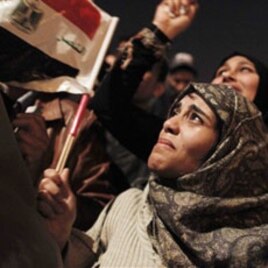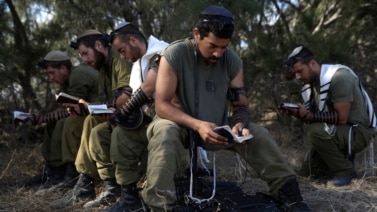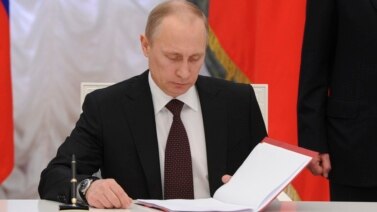
This is IN THE NEWS in VOA Special English.
The resignation of Egyptian President Hosni Mubarak after eighteen days of protests filled Cairo's Tahrir, or Liberation, Square with celebrations.
(SOUND)
CROWD: "Freedom!"
But with that freedom comes unanswered questions about Egypt's political future.
On Thursday, Mr. Mubarak had again told Egyptians that he would stay in power until elections planned for September. But on Friday his recently appointed vice president, Omar Suleiman, announced the resignation of the eighty-two-year-old president. He said Mr. Mubarak had asked the military to take control.

President Obama says the resignation marks only a beginning of Egypt's transition. Mr. Obama said Egyptians had made it clear that they will accept "nothing less than genuine democracy." He said the military will now have to make sure the transition takes place in a way that Egyptians can trust.
BARACK OBAMA: "That means protecting the rights of Egypt's citizens, lifting the emergency law, revising the constitution and other laws to make this change irreversible and laying out a clear path to elections that are fair and free. Above all this transition must bring all of Egypt's voices to the table."
Mr. Mubarak survived at least six assassination attempts as president. He was vice president to Anwar Sadat. He became president in October of nineteen eighty-one after militants killed Mr. Sadat.
Under Mr. Mubarak's rule, Egypt kept peace with Israel and close ties with the West. His government was an important ally of the United States in the Israeli-Palestinian peace process. He also earned Western support for his efforts to suppress Islamic extremism.
But he kept Egypt under a deeply unpopular emergency law that restricted freedoms and gave the police wide powers of arrest. Members of the Muslim Brotherhood, Egypt's leading opposition group, were often targets of those arrests.
We asked Egyptians and others to comment on Mr. Mubarak's resignation on the VOA Learning English page on Facebook. Here are some of their comments, starting with this from Wessam Elmeligi:
Ours is one of the most honorable revolutions in history. We did not fall into the pit of civil war. We did not get any help from any government. This is our victory. Our freedom. Our Egypt. Egyptians have taught the world one lesson: when the people speak, their voice is not words. It is thunder. And when thunder strikes, the entire forces of nature listen. Because thunder is sent by God.
Another Facebook user named Kefaya Punk said: In Egypt we were told that we can never revolt, but after we saw with our own eyes that Tunisians were able to oust their president and the regime, we were still suspicious that we would be able to repeat what they did, but we did.
Hanaa Elbhery said: I am Egyptian and I am so proud of the first real achievement of our generation.
And Mohammad Elfiky wrote: Some celebrate and some cry but we are all Egyptians. I love this land and I'm ready to die for it. Let's hope the future will be better than ever.
There were also expressions of support from other countries.
Heba Hassan wrote from Bahrain: Congrats to our brothers and sisters in Egypt! We are so happy for them. My eyes were full of tears when I heard the news on TV.
Jill Harper wrote: I am from the US and so happy for the Egyptians!!
Franz Josef Hildinger had this advice: Education is everything. Invest in it now!
Karam Adnan Alhafiz wrote: Congratulations. You proved that the will of the people is above everything.
And Iclal Yoksuc said to Egyptians: I hope you have a good president that cares about all Egyptians and that deserves you.
There were also comments like this from Peshang M Hussen: Now it is step 2 to dictators in other countries.
And this from Moshtaq Abdullah Jamel: Mubarak has gone with the wind. Who's next?
You can read all the comments and add your own at the VOA Learning English page on Facebook. Or post a comment at voaspecialenglish.com.
And that's IN THE NEWS in VOA Special English. I'm Steve Ember.
Contributing: Avi Arditti, Luis Ramirez



